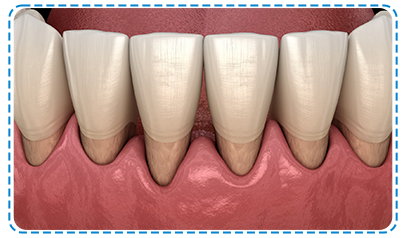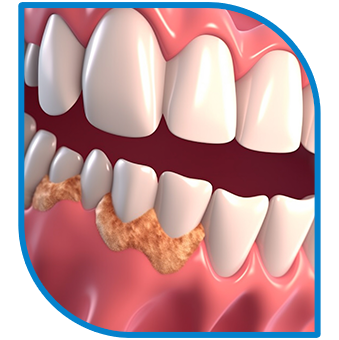Effective Treatment For Gum Diseases
Gum diseases, also known as periodontal diseases, are inflammatory conditions that affect the tissues surrounding the teeth, including the gums and bone. They range from mild gingivitis, characterized by red, swollen gums that may bleed during brushing or flossing, to severe periodontitis, which can lead to tooth loss and systemic health issues if left untreated.
Our experienced team of dental professionals specializes in diagnosing and treating a wide range of gum diseases, from gingivitis to advanced periodontitis, using advanced techniques and personalized treatment plans tailored to your unique needs.


Common Symptoms of Gum Diseases
- Red, swollen, or tender gums
- Bleeding gums, especially during brushing or flossing
- Receding gums, making teeth appear longer
- Persistent bad breath or a bad taste in the mouth
- Loose or shifting teeth
- Changes in the fit of dentures or partial dentures
How To Prevent Gum Diseases?
- Brush your teeth twice a day with fluoride toothpaste
- Floss daily to remove plaque and food debris from between your teeth
- Eat a balanced diet rich in fruits, vegetables, and whole grains
- Avoid tobacco use, which can increase the risk of gum diseases
- Schedule regular dental check-ups and cleanings

Gum Diseases | Frequently Asked Questions
While some gum disease treatments may cause mild discomfort or sensitivity, such as scaling and root planing, the procedures are typically performed under local anesthesia to ensure patient comfort. Our team uses advanced techniques and technology to minimize discomfort and promote faster healing.
If left untreated, gum diseases can progress and lead to more serious complications, including tooth loss, gum recession, bone loss, and systemic health issues such as heart disease, diabetes, and respiratory infections. Early intervention is crucial to prevent further damage.
If you’re experiencing symptoms of gum disease, such as red, swollen, or bleeding gums, persistent bad breath, or changes in the fit of your dentures, it’s essential to schedule an appointment with your dentist as soon as possible for a comprehensive evaluation and appropriate treatment. Early intervention can help prevent further damage and preserve your oral health.
Gum diseases are diagnosed through a comprehensive dental examination, which may include periodontal probing, X-rays, and other diagnostic tests to assess the health of the gums and supporting structures of the teeth. Early detection is key to preventing the progression of gum diseases.


